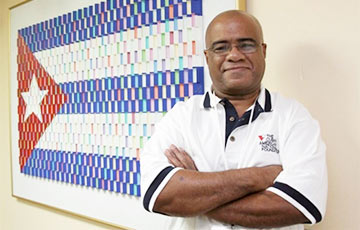Cuba And Belarus: Changes In Latitudes, Changes In Attitudes
6- Omar Lopez
- 27.05.2016, 15:14
- 22,244

Cuban vice-president Miguel Díaz Canel just concluded a three days official visit to Belarus, during which both regimes strengthen their ideological alliance.
On Monday, May 23rd he met with Belarusian dictator Alexander Lukashenko, to whom he extended an invitation from Cuban dictator Raúl Castro to visit Cuba. In reciprocity, Lukashenko also invited Castro to visit Belarus and mentioned that “the course of strategic association with the Cuban government is invariable”. A full honeymoon in course.
On May 24th, after the meeting with Lukashenko, Díaz Canel met at the Parliament building in Minsk with Mikhail Myasnikovich, chairman of the Council of the Republic, and Vladimir Andreichenko, speaker of the House of Representatives. The meeting lasted more than an hour, and they agreed to create Belarusian-Cuban joint companies in the field of pharmaceuticals to operate in Cuban technological parks.
The sympathy between these two relics of the Cold War is not new at all, there is a long history of cooperation between these two dictatorships, the last of their kind in Latin America and Europe respectively. In June 2012, Lukashenko visited Cuba and signed a cooperation agreement with Raúl Castro that included the installing in the Island of a Belarusian plant to repair and assemble tractors. On that occasion, Castro awarded Lukashenko the José Martí Order, a “distinction” also conceded by the Cuban regime to other dictators like Muammar Ghadaffi, Wojchiew Jarulselzki, and Nicolae Ceausescu, among others. A true Hall of Shame.
Sadly to say, the similarities don’t end there. Almost simultaneously, the European Union changed the course of its policies toward both regimes, choosing a new approach similar to the “constructive compromise” with the Apartheid regime in South Africa in their time. On February 15, 2016, the EU announced the lifting of sanctions against the Belarusian government and only 1 month later, on March 15th, the EU signed a cooperation agreement with the Castro regime, designed to surpass the previous policy, the Common Position, which conditioned any cooperation from the Block to the fulfillment of internationally accepted human rights standards.
The US also played along the same lines, partially lifting its own sanctions against Belarus and starting its own process of “normalization” with the Cuban government.
These changes were done in spite of the negative evaluation of the human rights situation in both countries by all the leading international organizations in the field, such as Amnesty International, Reporters without Borders, Freedom House and Human Rights First, to just provide a few examples. On the other hand, neither Cuba nor Belarus has made any changes in their internal policies.
But beyond the dynamics of what many people call real politick in the global village, the idea of appeasing dictatorships through negotiation without pressure, has proven wrong by the lessons of History. It didn’t work with Hitler, the Apartheid in South Africa, and it hasn’t worked in China either. In this modern in world in which we are living, with all the technological and informational advantages that emerge almost every day, is easier for these kind of regimes to establish alliances beyond geographical borders, to share their equal visions of power, characterized by a brutal repression to any form of dissent. In the global village, changes in latitudes don’t necessarily mean changes in attitudes.
It is not by chance that at the same time that Díaz Canel went to Belarus, Raúl Castro held a meeting in Havana with North Korean General Kim Yong Chol, in charge of intelligence and clandestine operations, among them the cyber war against the West. Also Cuban Foreign Minister Bruno Rodríguez Parrilla went to Venezuela to meet with Nicolas Maduro to ensure Cuba’s “loyalty” and “presence” in the country. The strategic alliances covering three continents, Asia, Europe and Latin America. Once the sanctions are lifted against two of them, they hurry to embrace each other against the West.
In this kind of political scenario, democratic solidarity is more important than ever, to counteract the biggest threats that Humanity faces today: violence, terrorism, drug trafficking and human trafficking. All of them have a common trail, the existence of instability zones produced by dictatorships that deny basic human rights to its citizens.
The facts are there. A report by Miklós Haraszti, United Nations’ special rapporteur on Belarus, established that “despite the partial suspension of EU and US sanctions, decided in anticipation of further advancement of human rights, the authorities have not ceased systematic harassment of those who attempted to practice their individual, civil, political and other rights. . . The authorities have not shown any willingness to reform the entrenched, highly oppressive legal system”.
One year after the announcement of the intent to “normalize” relations between US and Cuba, a joint report by the Foundation for Human Rights in Cuba and the Cuban American National Foundation stated that “In summary, the facts and figures shown in this report reveal that so far, the Cuban people do not perceive real benefits of this new framework for relations, and continues to seek the improvement of their lives in foreign lands, preferably in the United States. Moreover, the international community continues navigating the turbulent waters of a détente that has not registered concrete changes with respect to Cuba’s internal situation regarding human rights and fundamental freedoms of the Cuban people.
Cuba and Belarus are two good examples of this challenge. The EU and the US need to change their attitudes to a more proactive policy in demanding meaningful transformations, if they really expect to see true changes in both latitudes. It’s the best way to contribute to the solution of the global conflicts they both face nowadays, and also their moral obligation as the biggest reference for democracy and human values in the contemporary world.
Human rights director of the Cuban-American National Foundation, former political prisoner Omar Lopez, especially for charter97.org









